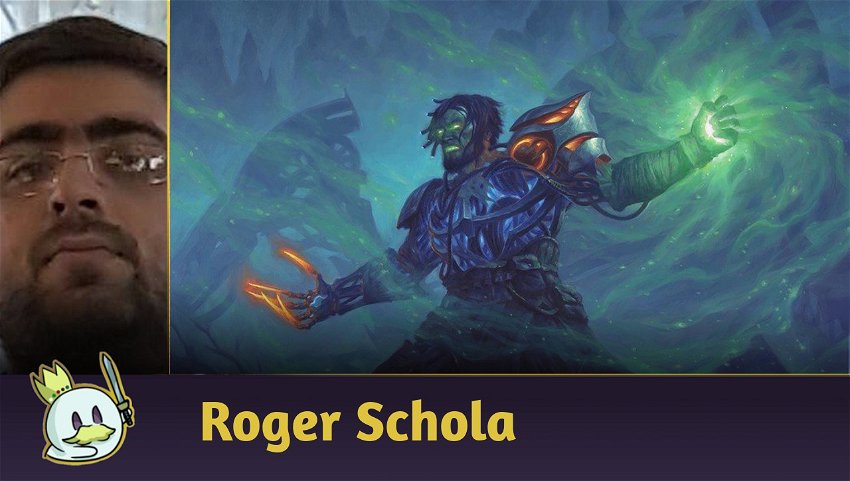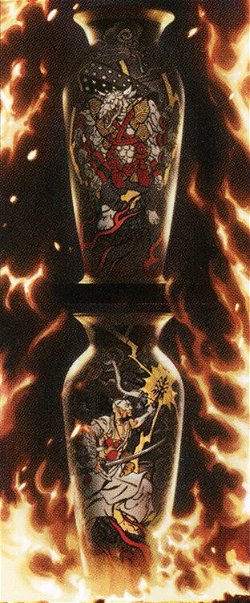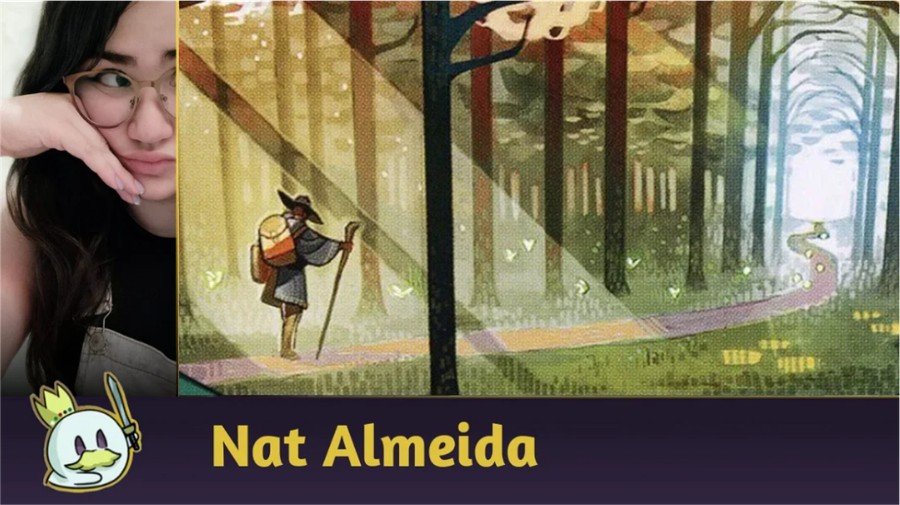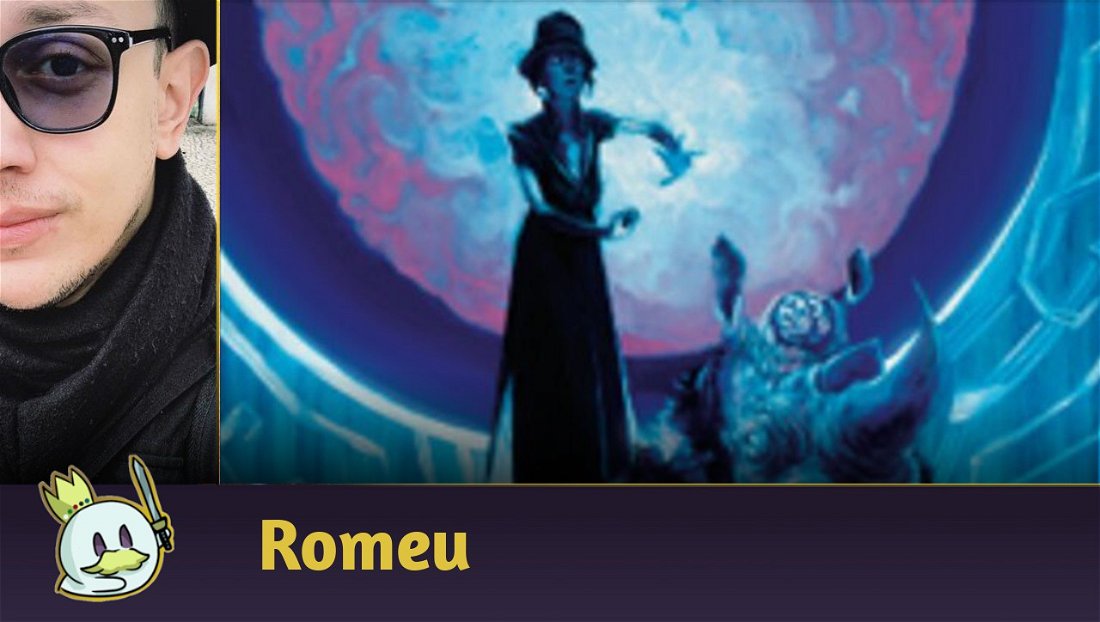Tired of Mono Red for farming and ranking up? How about a different and fun aggro?
Today I'll show you a really cool deck that has been winning over Standard format players!
Rakdos Meld's Game Plan
When playing with Aggros decks, your objective is to dictate the pace of the game and win in a few turns, by adding black, we can eliminate opposing creatures to guarantee direct damage to the opponent, thus avoiding blockers and that we lose creatures, maintaining the constant pace and pressure.
The icing on the cake is when we manage to activate Mishra, Claimed by Gix, practically guaranteeing victory, as it is unlikely that the opponent can hold Mishra, Lost to Phyrexia.
Decklist
This deck is made up of 26 creatures, 4 enchantments, and 6 instants, with the highest mana cost among these cards being 4.
One mana:

Kumano Faces Kakkazan is a card that arrives dealing damage, increases the power of your creatures on turn two and on turn three gives you a creature that helps keep the pace. It gives you three perks for the cost of one.
Rabbit Battery, in addition to attacking, the ability to reconfigure makes Mishra, Claimed by Gix enter the board attacking, which allows activating Meld, if Phyrexian Dragon Engine is also attacking on the same turn.
Play with Fire will normally be used to deal direct damage to your opponent to grant scry 1, but it can be used to finish off any opposing creature that could give us problems in the future.
Two mana:

Misery's Shadow grows considerably, especially at the end of the game, in addition to helping not to leave creatures in the opponent's graveyard.
Tenacious Underdog is a creature with a good power, in addition to coming back from the graveyard and granting extra cards.
Infernal Grasp destroys any creature and Go for the Throat destroys creatures that aren't artifacts, ensuring a balance — since in the format we have many artifacts and Infernal Grasp has a penalty to be cast
Three mana:

Gix, Yawgmoth Praetor in addition to having a robust body, helps us with extra draws, collaborating in keeping our hand always full — something we need to maintain gas and pressure until the end.
Reckless Stormseeker, in addition to buffing our creatures' power, gives haste to them until the end of the turn, and we'll usually give this ability to Mishra, Claimed by Gix to activate his ability.
Phyrexian Dragon Engine is one of the cards we need to be able to bring Mishra, Lost to Phyrexia, in addition, of course, to having Double Strike that causes a lot of damage to the opponent on an empty board. The ability to unearth helps us to bring it back from the graveyard for a turn.
Four mana:

Thundering Raiju arrives slamming and putting a +1/+1 counter on another creature or itself, dealing direct damage to opponents and maintaining pressure from the moment it enters the battlefield.
Mishra, Claimed by Gix, in addition to being an important piece for the deck, can deal direct damage to the opponent. He also has a good toughness to stay alive against most of the damage he could take.
As you can see, the deck is very explosive, and we won't always close the game with Mishra, Lost to Phyrexia, but having this "free-win" option is great.
Mulligan
The perfect starting hand would be Kumano Faces Kakkazan, Misery's Shadow and Gix, Yawgmoth Praetor, one removal and three mana.
How can we not always have the perfect hand when we should be worrying about Mulligan?
Considering that we need to attack from the beginning, a starting hand with four mana or with three three-cost creatures ends up taking away the explosion we need at the beginning to end the game quickly. So, always think of Mulligar when you have a heavy hand.
Postures
Rakdos Meld is the one who should dictate the pace of the game, being aggressive from the first turn until the end.
If at some point you change your attack posture to become defensive, the chance of defeat is great, especially if your opponent has some lifegain, as this harms the pressure you apply to win the game. It can also be complicated if the opposing deck manages to eliminate your creatures.
We have creature removals to eliminate possible blockers and continue to attack the opponent, thus maintaining the pressure we need to win the game. Usually in turn five or six we will be able to meld Mishra, Lost to Phyrexia which gives us almost guaranteed victory.
Sideboard Guide
I'll be quite straightforward, since the Metagame hasn't adapted to The Brothers' War yet! Then we'll elaborate on specific archetypes.
Vs. Lifegain
We'll start talking about a match that can be complicated, but that we can win with the Sideboard cards.
Every Aggro deck trembles at the sight of its opponent gaining too much life. However, with the right cards entering the deck, this fear of the opponent's recovery falls to the ground.
Knight of Dusk's Shadow is the main card against life gain. With it on the field, the pressure will be constant on the opponent, and with the ability that makes its power increase, the creature ends up forcing the opponent to worry on dealing with it as soon as possible
Side in:

Side out:

Vs. Control
This is a matchup where patience and the starting hand make all the difference — both yours and your opponent's.
Control Decks will try to delay your game, either by countering or destroying your creatures. To overcome this, we will have to rely on some cards that end up giving us a numerical advantage on the field, especially when sweepers come into play.
Jaya, Fiery Negotiator gives us a creature token and can also give us a chance to play one of the top two cards of the library, thus helping to maintain constancy.
Ob Nixilis, the Adversary is another one that goes into this style, only more aggressively. You force your opponent to discard a card or they'll take damage to keep the card in their hand — plus you get to create two copies of him if you sacrifice a creature once you cast it.
Note: This is a card that everyone has doubts about using one or two on the sideboard, it's up to you.
Side in:

Side out:

Vs. Combo
In this matchup, your patience and empathy with the other person will be tested many times.
To hold a combo deck, the main thing is to know what combo the deck uses, and to eliminate these cards whenever you can.
We should focus on dealing as much damage as possible, and we'll play some specific cards.
Duress will be for specific cards in the combo or cards that seek the cards for the combo, an example is Diabolic Intent.
Another card that ends combos, whether from creatures or artifacts, is Brotherhood's End, an excellent answer that also works to deal with opposing aggro decks.
Side in:

Side out:

Vs. Aggro
Fast matchups with many removals are expected in this game. The best starting hands and card draws can be the difference between victory and defeat.
Another thing that guarantees us a breather would be gaining life, so Sheoldred, the Apocalypse has a robust body to hold attacks, in addition to causing damage when an opponent draws cards, and giving us life when we draw cards.
If the opponent's deck is made up of soldiers, for example, then it's worth putting Brotherhood's End to remove creatures from the battlefield even if yours are also eliminated.
The star of the deck, Mishra, Claimed by Gix has the body to withstand this card and if Phyrexian Dragon Engine dies, we can unearth it to trigger Meld.
Side in:

Side out:

Conclusion
Rakdos Meld is a fun deck that has been appearing frequently on MTG Arena as many people are looking for the next best Aggro deck.
So, that's it for today, I hope you enjoyed the article! Leave your feedback for improvements.
Until the next time!













— コメント 0
, 反応 1
最初にコメントする